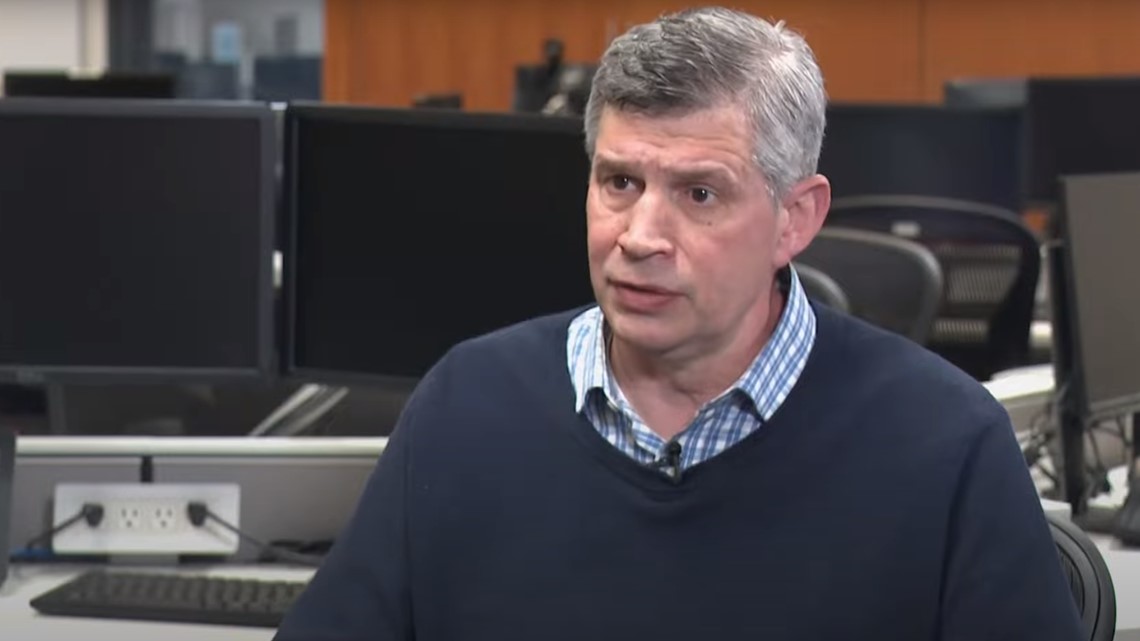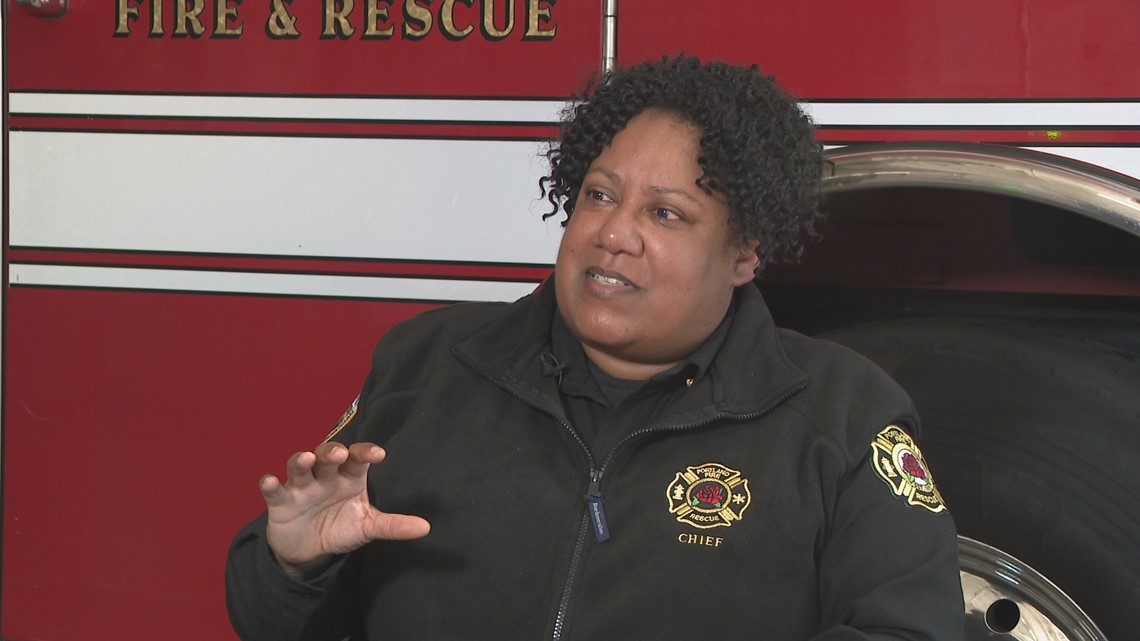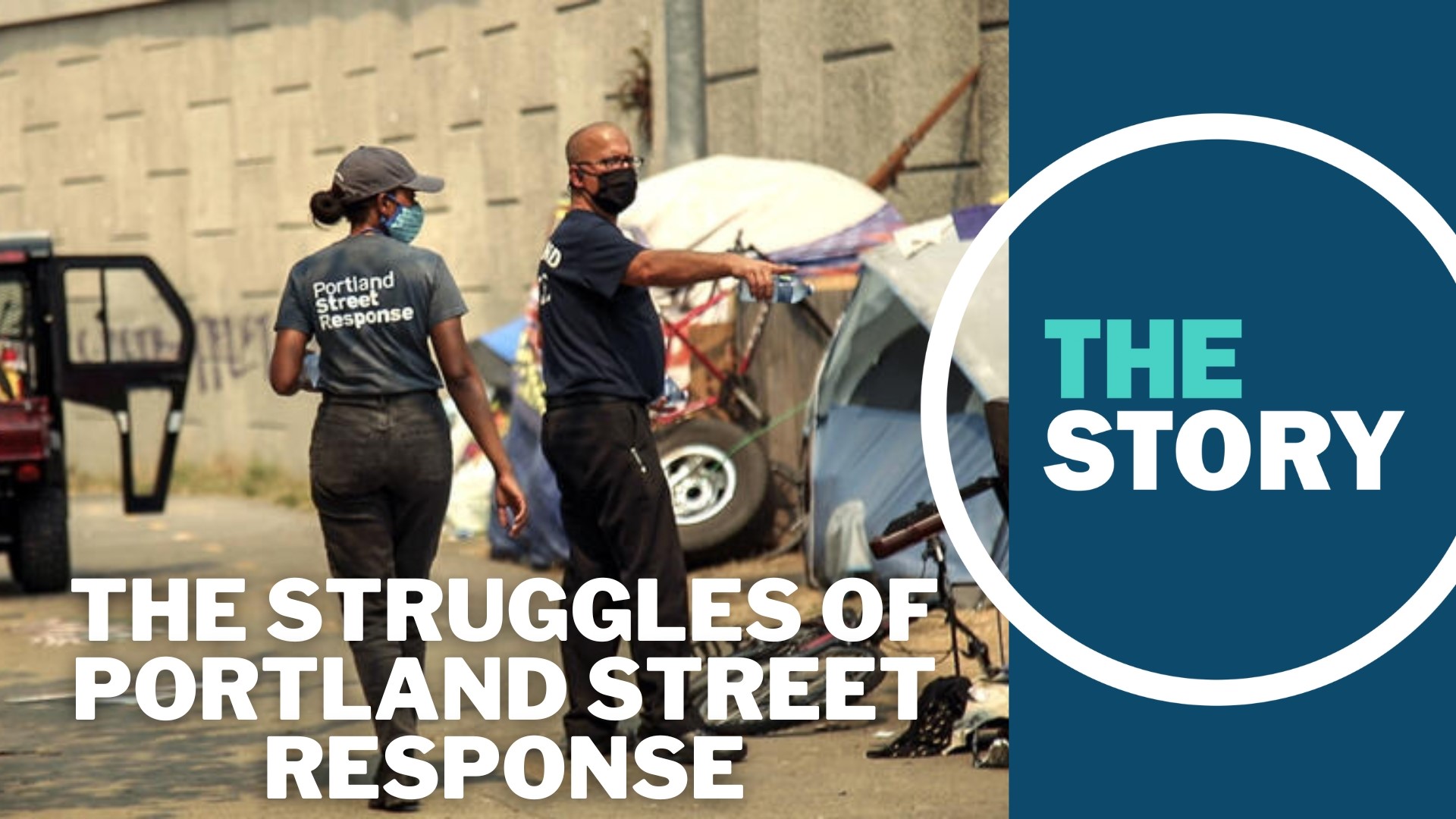PORTLAND, Ore. — After two years of expansion and widespread praise, Portland Street Response has rather suddenly run headlong into uncertainty and strife — putting the program's future in jeopardy.
The PSR pilot program first launched back in February 2021, operating in just a small part of Southeast Portland. The idea was to send trained workers out to calls involving mental health issues and homelessness, the kind that police are ill-equipped to handle.
It would be better for police, proponents reasoned, and better for people in crisis as well.
Each responding team is made up of a paramedic and a mental health worker. They are dispatched by 911 operators to non-criminal calls, particularly welfare checks.
A recent Portland State University study found that over the last year — PSR's second in existence and its first since expanding citywide — the program handled 7,418 calls. That resulted in a 3.5% reduction in calls that would ordinarily have gone to police. Overall, police went to 19% fewer non-emergency calls.
People cited in the PSU study who had been helped by PSR gave them a rating of 4.8 out of a possible 5. Of those 7,400 calls, PSR helped place 10 people into permanent housing.


But it hasn't been without growing pains. One of the PSU study authors said that the group needs more oversight by professionals in the mental health field.
"They need more robust delivery of clinical supervision and people who are trained and licensed clinical providers — clinical mental health providers who can provide them with the support they need," said Greg Townley, PSU researcher on homelessness and community. "When they're in the field they know they can call someone to provide that in the moment support and guidance."
One consistent source of tension has been PSR's place under the umbrella of the Portland Fire Bureau. It was placed there, in large part, because the then- commissioner who championed the program, Jo Ann Hardesty, had charge of the Fire Bureau. She's since been replaced by Commissioner Rene Gonzalez, who received support from both the police and fire unions during his election campaign.
PSR's placement in the Fire Bureau helped it gain access to 911 dispatch, according to its website. But right now, there's a growing argument over what direction the program should take — disputes that might see it shuffled elsewhere.
Last winter, Gonzalez directed PSR to stop distributing tents and tarps in its contacts with homeless people due to the fire risk at camps. PSU's report found that the program had given out more than 2,200 sleeping bags, blankets or tents.
Gonzalez also ordered that PSR be present when city-contracted crews sweep homeless camps, remaining available in case someone goes into crisis. Several PSR workers objected to the change, and Townley has suggested that this directive undermines the role that the program was designed to fill.


For his part, Gonzalez recently told KGW that he likes the PSR program, but he feels that its mission needs to be more clearly defined.
"We're all looking at a really difficult humanitarian crisis on our streets, the homeless problem. And we're just trying to figure out what Portland Street Response's piece of that equation (is)," he said. "Certainly someone in mental distress needs non-police intervention. There's food needs, there's clothing needs. There's sometimes Narcan, much less long-term behavioral health and shelter, eventually housing. Portland Street Response can only sorta fill one part of that in the larger solution."
Even prior to the changes that Gonzalez made to PSR's role, the program struggled to field enough workers to respond quickly to all of the calls sent its way. A long-awaited plan to have the program provide 24-7 service has been pushed off indefinitely amid a hiring freeze instituted by Gonzalez.
The view from above
Earlier this week, The Story aired the first part of an interview with Portland's outgoing fire chief, Sara Boone. With her time in the role dwindling as she heads into retirement, Pat Dooris asked her for some insight into how the rollout of Portland Street Response has been, from her perspective.
"It seemed like it had, you know, it had kind of a big splash start and then now maybe is going through some troubled waters," Dooris remarked.
"Well, I think with any new program, any pilot, any new program, you know, it can start off with a bang. That's one impression ... and you can get further along the line and then you're gonna see other challenges," Boone said. "And I think where we are today is you can either be so focused and militant on one way, and the only way, that you lose sight of, 'Here are the things that we didn't even think about in the beginning because he couldn't even think about them.' But they are, you know — these are things that we have to look at right now before we go forward. And I don't wanna get too specific, but I think, you know, this is something that Chief Gillespie has taken over and looked at, and I think it really is what is within this structure that we are missing when it really comes to building a strong foundation."
Chief Boone said that there is much more to a city-run program than the public sees. She agreed that PSR sounded like a great idea, but said it lacked some vital behind-the-scenes structure to make it work in the long term.
"Not just looking at the outward facing service, but what's going on when it comes to the foundation and the support. And do you have the resources? Do you have the training? Are those policies in place? And do you have teams that can support the expansion of what we're trying to provide out in the streets? And we don't, we just don't," Boone said. "And then some of the feedback that we also know, because we're trying to spin up as rapidly as possible, that we're not really taking that feedback, analyzing it, and then saying, 'Well, how do we address this gap?' So I think, you know, I'm not on somebody else's political timeline, but I know there's huge things to get going, you know, in a short amount of time. But that's what we did the last two years and it's ... Great people are paying the price, where it's like, 'We've given you our heart and soul to build this new program, but there are things that are fundamentally missing that we have to have in place.'"


She added that PSR was unique and successful at the outset because it used input from those they were helping in order to design the program. Now she's concerned that it has lost its way and needs to pick a focus.
"But I think where we're also at is — are we in competition?" Boone began. "Are we doing duplication? Are there things that we've lost and (strayed from)?"
"Is that like you talking about handing out the blankets and the tents and that kind of stuff? Or no?" Dooris asked.
"Well, or looking at the iteration is ... if this is what that is, you know, is the Fire Bureau the right home for it? And it definitely is not the mechanism of distribution if it is gonna be in the fire bureau," Boone said. "So where, where are they aligning with? And again, are you aligning as a 911 first responder, or are you aligning with a network when it comes to providing social services, when it comes to crisis intervention and when it comes to connecting to resources.
"I don't know. It's a little bit of everything, but I think that's where everybody needs to have that discussion and be like, are we actually gonna be mobile crisis — highly technically skilled, that augments, I would say, or supplements — that you can send ... because fire and police, right? I can't speak for police, so I'll just speak for fire. Many of those calls were sending police because you didn't have-"
"There's nobody else," Dooris offered.
"There's nobody else, right?" Boone agreed. "So if you do have the mental health responder, a clinician that highly skilled, and it is, we're sending you in to deal with this crisis. Great. What happens after that? Or you go back in service then onto the next call. If we wanna be social services, where we're distributing, you know, clothing and food boxes, and that's a whole-"
"And how are you any different than all the nonprofits that are doing that?" Dooris asked.
"And that's okay. But it has to be coordinated and under some sort of structure that makes it efficient," Boone said.
Portland Street Response has a budget of roughly $10 million for this fiscal year, which started a few days ago. OPB reports that this budget is made up of mostly one-time funds, the kind that won't be available next year.
Meanwhile, recent leadership changes do not bode well for the fledgling program. Robyn Burek, the program manager who has led PSR since its founding, confirmed last week that she is leaving for a role at the City Auditor's office. Willamette Week has also reported on the sidelining of Division Chief Tim Matthews, a supporter of PSR while head of the Fire Bureau's Community Health Division. Matthews was supplanted by Division Chief Ryan Gillespie — the man now tapped to lead the Fire Bureau as chief when Boone retires.

